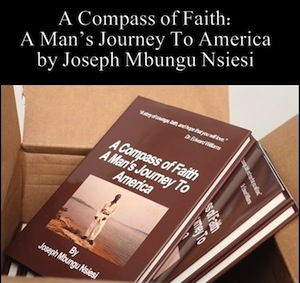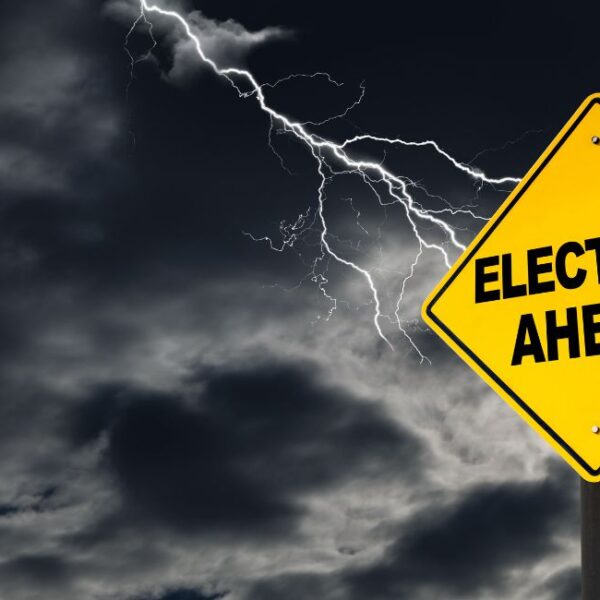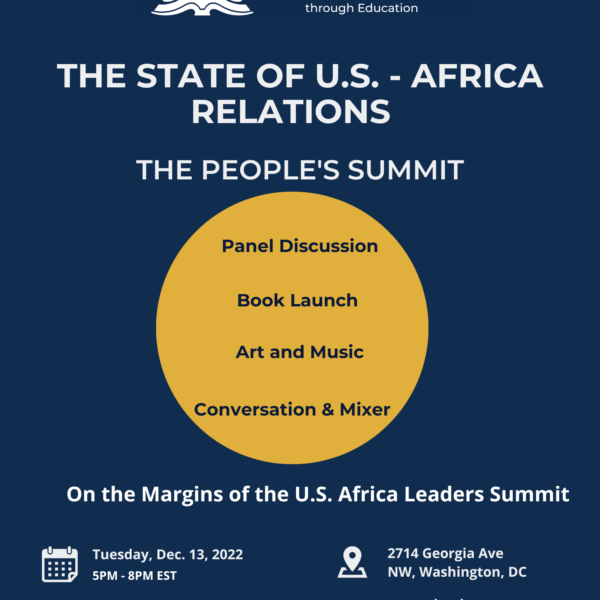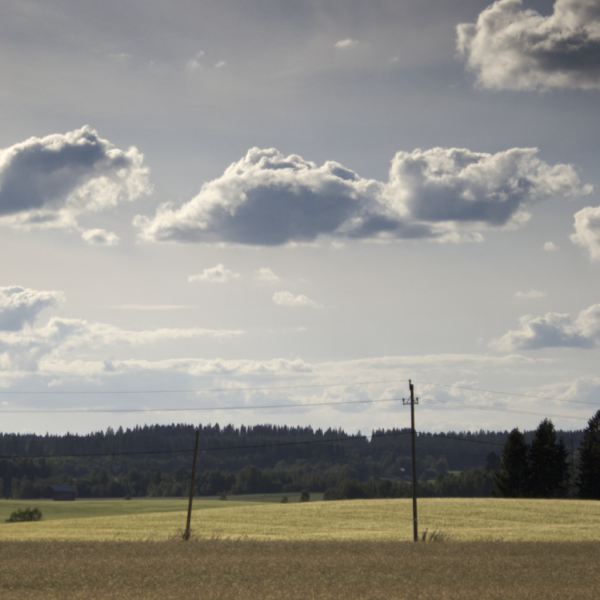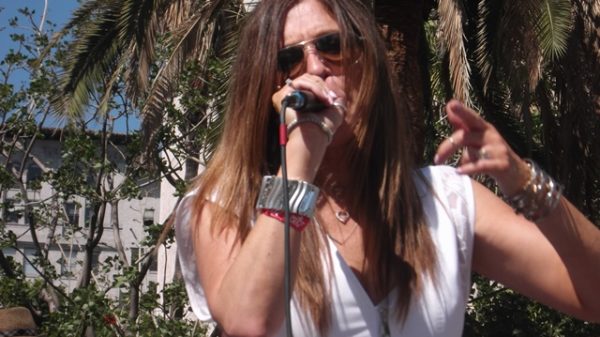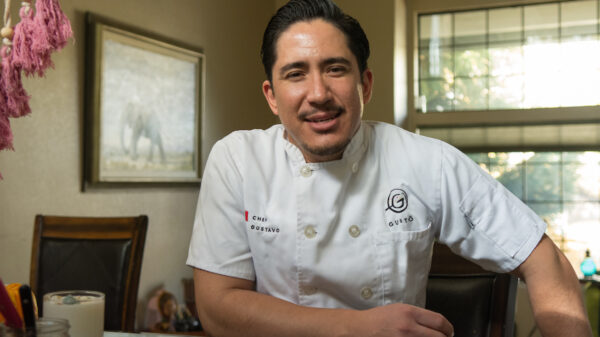TIM, Making Money, Book Review
A story by Joseph Mbungu Nsiesi, A Compass of Faith: A Man’s Journey To America chronicles an African immigrant’s harrowing experience across the deepest and second largest river in the world. The Congo River is notorious for its treacherous whitewater, its currents and high density of deadly reptiles including crocodiles and hippos that lurk in its path. In recent years American tourists and locals witnessed as their guide got pulled from his craft into the river by a crocodile never to be seen again. When Nsiesi decides to leave his motherland by way of these dangerous waters, one that would shape his life in many ways and test his faith, one wonders what could have a driven a man to leave his family for an expedition that seemed fated for disaster and tragedy.
Excerpt from A Compass of Faith: A Man’s Journey To America
“Death was sleeping all around us. I could feel her in the high cries of uncomfortable babies and the low moans of old men as they fight the pain and discomfort of dysentery. This would be a trip through hell, and perhaps some unfortunate souls on this boat would not make it out alive, as is often the case on the Congo River. Perhaps, we all knew that some of us wouldn’t all arrive at our destination and that we would meet our Lord, our Maker, here on this black river of death and hope.
 Death and hope, can it be one and the same? With this river, the answer is yes. People lived and died under the power of this powerful river every single day. It was now my turn to make this journey on its surface. Despite my deepest fears, I feel the warm breeze of God’s grace lingering around me in the air. Yes, hope is a powerful element in each of our hearts and that is what everyone here now clings onto tightly and with both fists, even if it means kissing death right on the lips.”
Death and hope, can it be one and the same? With this river, the answer is yes. People lived and died under the power of this powerful river every single day. It was now my turn to make this journey on its surface. Despite my deepest fears, I feel the warm breeze of God’s grace lingering around me in the air. Yes, hope is a powerful element in each of our hearts and that is what everyone here now clings onto tightly and with both fists, even if it means kissing death right on the lips.”
Where are you from and what pushed you to make this trip out of your motherland?
I am from the Democratic Republic of Congo (formerly known as Zaire). In 1995 I barely escaped my country leaving behind my loving family and friends because my life was in danger as a result of my activism and political affiliations against the monstrous government in power.
What prompted you to write this book?
One day on my job in the hospital I met a patient who was very interested in African stories. He was a white male in his seventies who was very curious about Africa. After chatting at length his last word was for me to become a writer so I could share my stories with Americans and the rest of the world. As my shift ended that evening, I went home thinking about our conversation. The following evening when I returned to work, I learned that, that patient had passed away a few hours after I left the hospital. I was very shocked by the news; but at the same time I felt inspired because in our culture we value the last word from any dying person. As I started writing my book, I could not stop thinking about him.
Now that you have settled here in the USA, was the risk you took worth it? Would you make this trip again if given the chance?
The risk I took was worth it because I now have freedom, job, family, and I can help a little bit those who are suffering in Congo. Many of the friends I left in Congo have no lives; they are still living with their parents because they have no jobs even though they have children. Most important, they have no freedom. I recall that three of my friends’ children passed away because the parents did not have money for treatment. If I had not sent them money, they would not have been able to bury the bodies. I am still a man of faith and I would make this trip if I was given the chance again.
Your story is about a harrowing experience in your journey out of the Congo comparable to the immigration challenges faced by many illegal immigrants who risk their lives crossing the borders. What is your take on how they are received and treated?
When I was crossing the Ubangi River from Zongo (Congo) to Bangui (Central African Republic) by the manual piece of tree called pirogue or canoe, I did not know I was crossing illegally until when I saw a powerful and speedy Ubangi boat running towards us in the middle of the river poised to knock us down and sink us into the biggest and deepest river in the country. I believe this kind of situation is similar to other immigrants who run away from their country because of the death or life situation. When this happens to anyone, I guess the best solution is to arrest the person and assess his/her situation, rather than attempting to kill him or her right away because the victim entered the safety land illegally.
“A Compass of Faith: A Man’s Journey To America”, why the title? What role did faith play in this experience and does this continue to be a centerpiece of your life experiences?
My journey started from Kinshasa, the capital of Congo, to America. During my trip I had no clue how to get to Bangui because I had never been there or in the Congo River before. What I knew was using the Congo River was a death or life situation because of its background track record when many boats had sunk and with no survivors. I succeeded in entering The United States of America because I was using both a compass and my faith during my trip that lasted about one year. Without my faith, I would have quit my plans when I experienced the first incident that happened at the corner of our home when I entered in a gangster’s car thinking it was a cab. Faith is something that I live by and I cannot accomplish anything without.
Have you been back home and what is your message to many contemplating such a trip?
Yes, my message to many contemplating such a trip is to advice them to use “the power of God”, because everything I accomplished during my trip was not by my strength but in the Lord God’s power. In Congo my own government put me down. I could not feed my family, I could not attend school, and I could not talk against our monstrous government. When I decided to escape death from my country, I struggled during my trip. I battled hunger, getting killed, developed dysentery, was robbed, discriminated, and betrayed by my friends. No matter what I was going through, I succeeded because I placed God as the solution of my problems. Those who put me down, I cried to God and He raised me up.
Since making this trip what have you accomplished?
This trip helped me gain freedom in America. I brought my wife, Nenette, who I feared I would lose when I almost faced death in the Congo and Ubangi Rivers. I have three beautiful daughters, Palmir, Admir, and Bellamir Nsiesi. This trip helped me attend college and University in America and to work as a registered nurse (RN). I have helped many people, families, and friends who needed financial assistance in America and in Congo. I have contributed to many organizations, including my nonprofit organization called NFDPC (The Nsiesi’s Foundation for Disease Prevention in Congo (www.nfdpc.org). Furthermore, living in Congo for 26 years, I was never given the chance to vote and even out here in America I still have not had the chance to vote for my country Congo but now I can vote in America.
After reading this book what do you want readers to get or feel about your immigrant experience?
Readers should know that if democracy was valued in my country I would never have been forced to face all the challenges I experienced during my long journey. For example, sometimes when I think of the day the French Embassy refused to issue me a transit visa, I can’t blame them too much because it would not happened in the first place if I was treated as a human being in my own country.
 A Compass of Faith: A Man’s Journey To America can be purchased at the following places:
A Compass of Faith: A Man’s Journey To America can be purchased at the following places:
http://www.thebeststoryfromafrica.com/
http://www.barnesandnoble.com/
ISBN: 978-1-4497-5233-0 (Hard cover)
ISBN: 978-1-4497-5235-4 (Soft cover

